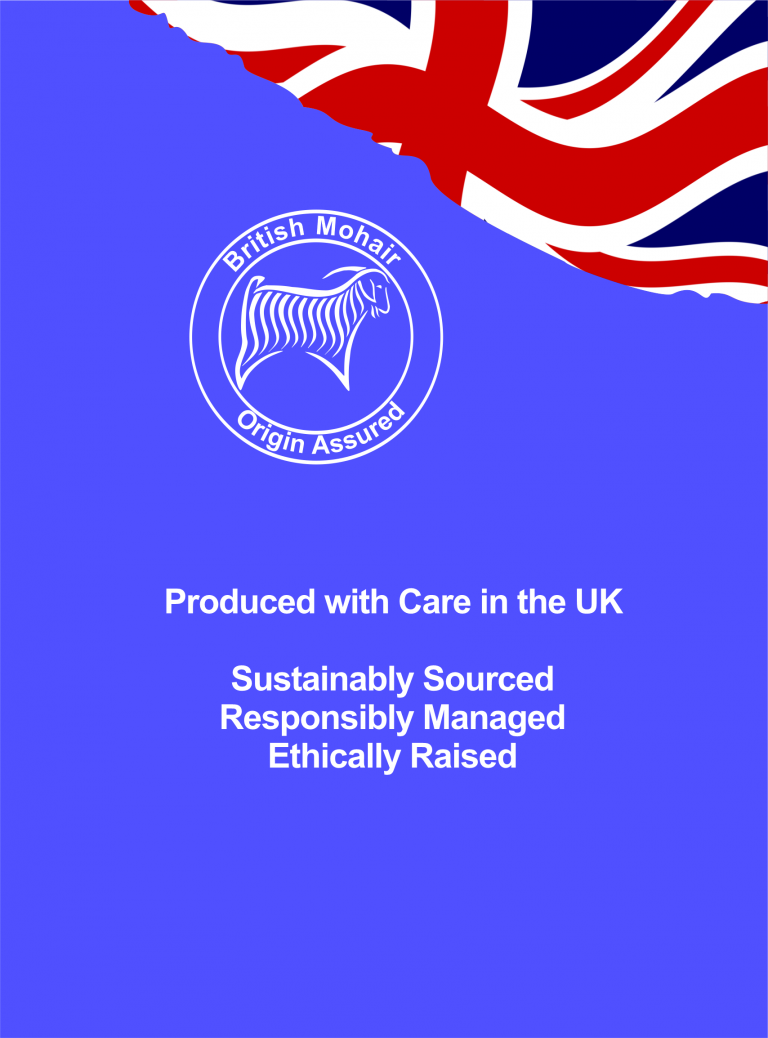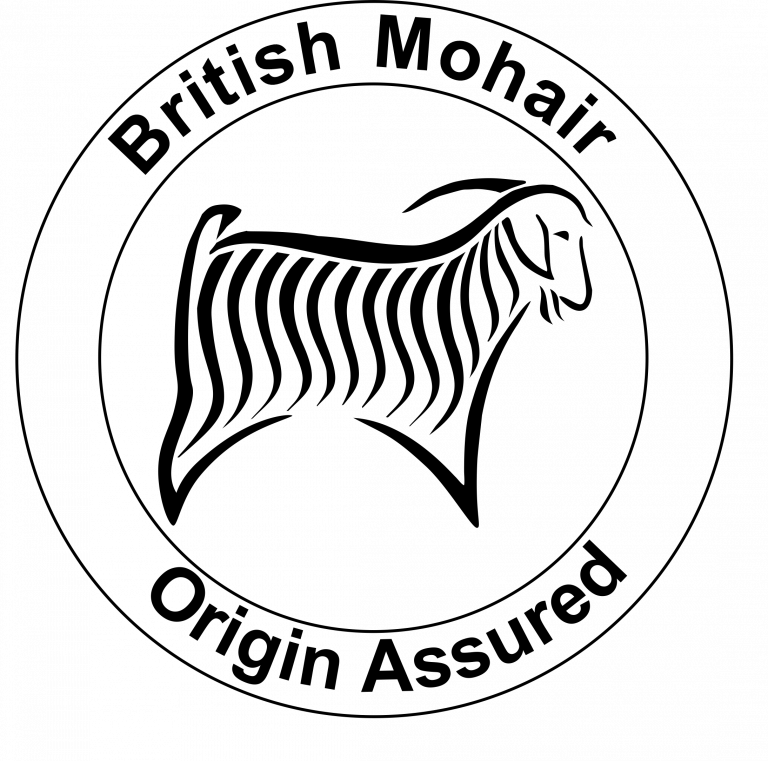Origin Assured
British Mohair - Origin Assured
We live in a world where authenticity, provenance, quality and environmental concerns are increasingly important to consumers. And when it comes to natural products like Mohair, adherence to the highest ethical and animal welfare standards is equally critical.
British Mohair Marketing has introduced the “Origin Assured” initiative to showcase how mohair produced here in the United Kingdom leads the way in all of these critical attributes. Accreditation to the program requires producers to sign up to the latest animal welfare standards and supply only Mohair from animals raised by themselves right here in the UK. The raw fibre is processed in West Yorkshire and kept distinct from fibre sourced from elsewhere before finding it’s way to specialist manufacturers who value the unique heritage and authenticity of this luxury product which is only available in limited quantity.

Look for the Logo!

Whether you are buying yarn, fabrics or finished products from our processing partners, or finished products from some of our producers who are also “on farm” processors, the “Origin Assured” stamp is your assurance of authenticity and provenance.
When you see the Origin Assured stamp, or the display card or swing tag you can be reassured that you are buying a quality product that is not only sustainable but is also ethically and responsibly raised, locally produced and processed here in the UK and comes from small family owned farms where animal welfare is the top priority.
The need for a UK-oriented Standard
The “Origin Assured” initiative has been launched by British Mohair Marketing to meet the specific requirements of the UK market and the needs of the small family owned farms which raise Angora goats for their Mohair here in the UK. From the peak in the early 1990’s when there were more than 15,000 Angora Goats registered in the UK the numbers have steadily declined as the original breeders and keeper retired due to age and health. Today in 2024 there are less than 1,000 purebred animals left, both registered (with the UK Breed Society, the British Angora Goats Society (usually referred to as BAGS)) and unregistered animals. This a tiny fraction of the numbers of Angora Goats in the main producing countries such as South Africa, Australia and the United States where numbers exceed 100,000 and the commercial flocks are frequently more than 500 animals strong employing numerous workers. To reassure potential mohair buyers and ensure that adequate welfare and land management standards were being maintained the Responsible Mohair Standard was introduced as a voluntary standard that could be recognised globally and required farmers and intermediate processors in the supply chain to be certified (by licensed third party agencies) and evaluated against a wide ranging set of criteria, including animal welfare, land management and social welfare. Whilst this made sense in the context of the large commercial farms the practicalities here in the UK given the small numbers of animals involved and the scale of the farming operations make such a wide ranging certification impractical.
RMS certification has become very widespread in the main mohair producing countries and in demand by the big commercial buyers and the inability to proceed down this route for UK producers has been an issue. At the same time RMS certification covers a wide range of areas including land management, sustainable/regenerative farming, animal husbandry and welfare, staff skills training, management and emergency planning and more. It is also focused (although not exclusively) on the extensive grazing practices under arid conditions common in the southern hemisphere producers. These are a far cry from the prevailing environmental conditions here in the UK. Equally, many of the land management aspects are already covered by existing and planned initiatives from DEFRA here in the UK which made their inclusion in a standard aimed at Angora Goats somewhat superfluous. Whilst the principles of certification make sense in providing guidance to producers and confidence to customers it became clear we needed to take a different approach!
The "Origin Assured" scheme is born!
After considerable investigation of other Mohair initiatives around the world (including Australia and The USA) commonalities emerged, primarily around the basics of animal welfare and husbandry. By extending our investigations to include other fibre producing animals such as Alpacas but especially UK native rare breed sheep it became clear that the local provenance and rarity of mohair produced by Angora goats in the United Kingdom were assets rather than issues! Rather than competing as an almost insignificant player in the global market, we could be a dominant player in our own home market, selling a unique product that offered a compelling “back story” of well cared for animals raised in a responsible and ethical manner on small, family owned farms. The considerable environmental issues of shipping raw mohair fleeces to the South African markets had long been a concern for some producers so processing locally and then protecting the local provenance simply added to the attraction. About the same time we were approached by a Yorkshire-based spinning mill who were looking for British originated mohair to blend with British rare breed wool to produce high quality and unique yarns. The need for RMS certification became unimportant since it was outweighed by the unique sourcing and high welfare standards inherent in UK agriculture.
Sustainably Sourced – Addressing Carbon Emissions and Helping British Industry
The Origin Assured scheme applies only to mohair collected from purebred Angora goats raised in the UK, which is then collected by BMM, consolidated and repacked before shipping to our selected processing partner in West Yorkshire where it is processed on traditional equipment by a skilled workforce, keeping the skills of an age old industry alive. By keeping the raw fleece separate they are able to maintain the chain of local origin intact to ensure that buyers can rely on the authentic and unique nature of the processed mohair. Most of the world’s mohair passes through the monthly auctions in South Africa, but this obviously comes at a significant environmental cost in carbon emissions which the local sourcing and processing inherent in British Mohair completely avoids.
Responsibly Managed – Caring for Goats and the Environment
Raising Angora Goats in the UK is far distant from the more intensive farming methods necessary for farms (and farmers) to survive in today’s world. British Angora Goats are raised in small groups, where the family bonds are strong (goats are very social animals and being in familiar company is an important element to their welfare) on small family-owned farms across the UK. When you only have a few acres you naturally take good care of it so the principles of Sustainable Farming and Regenerative Agriculture are built in to everything we do. Goats are browsers rather than grazers and like nothing better than browsing a hedgerow or grazing an area of rough grazing. Planting trees and new hedgerows is an effective way to reduce feed costs and enrich the diet of goats as they exhibit their natural behaviour. Whilst goats (especially youngsters or those that have just been sheared) need shelter from the rain and cold of our northern temperate climate Origin Assured promotes the need to allow goats to graze and forage when weather conditions permit.
Ethically Raised – Addressing Animal Welfare
Within the small British Angora owner community animal welfare is a given, with typical flocks less than 20 or so animals, who are treated as individuals, some might say almost as pets! Nevertheless the Origin Assured scheme goes beyond the classic “Five Freedoms” model developed in the 1960’s that has become the “Gold Standard” to take advantage of more recent understanding of animals mental state outlined in the Five Domains model. Created in 1994 this model encompasses everything in the Five Freedoms approach but stresses the way animals feel about their environment (their “mental state”) and stresses the value of human interactions. The aim is for animals to to live out their natural life as “life worth living”. To this end Origin Assured prohibits the culling of animals except in exceptional health-related emergencies or under the direct instruction of a qualified veterinary professional.
How does Origin Assured Work?
Registering as a producer under the Origin Assured scheme requires a voluntary commitment (and signed pledge) to adhere to the principles laid out above and in the guidance notes available. Once the signed pledge has been received by British Mohair Marketing (digital pledge is acceptable) a registration number will be assigned and can be used on marketing materials to promote your acceptance of these standards. Any raw fleece you submit to BMM as part of the annual collection will be consolidated and supplied to our selected processing partner to be processed and enter the British Mohair Origin Assured supply chain. The registration number and logos may also be used by those producers who process their own raw fibre and sell the finished goods (excluding raw unprocessed fleece) directly to their customers.
